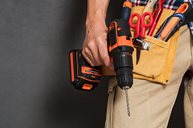Do you have a part time job or jobs? Learn all about lodging your tax return including deductions you can claim.
Tax returns for part time workers
If you earn over the $18,200 tax-free threshold, you must lodge a tax return, whether or not you are full-time, part-time or a casual employee. Even if you earned less than the tax-free threshold, you might have to lodge a tax return if your employer deducted any tax, so that you can get a refund of that tax.
For the 2025 and 2026 years, if you earn $22,575 or less, you can combine the tax-free threshold with the low-income tax offset to reduce your tax bill to nil. That means you will be entitled to a refund and get most of your tax back come end of financial year.
Multiple part time jobs
If you have multiple part-time jobs, tax can get a little confusing. Problems can occur for people with two incomes even if the taxpayer and employers do the right thing as determined by at the ATO's PAYG tax rates.
The problem arises because the first job attracts the tax-free threshold while the second job (and subsequent jobs thereafter) is taxed in line with the progressive tax rates outlined by the ATO.
To make the most of your tax return and maximise what you get back, it is important to understand the different expenses you can claim.
Travel expenses
You can claim a deduction for any costs you incur on traveling whilst you are working, either using your own car or public transport. That might include transport from your regular workplace to a different workplace, for example to a client's office or a meeting.
That generally doesn't include the cost of home to work travel (the daily commute) which is considered private travel and not deductible. However, if you have two or more part time jobs and you drive directly from one job to another job you can claim the travel between the two.
The most important thing to remember when it comes to vehicle and travel expenses is that you must keep records. This will make everything a lot easier for you come tax time. Read more about how to claim your car expenses at tax time.
Clothing
Clothing can only be claimed if it is specific to your occupation, for example, a compulsory uniform that identifies you as an employee of an organisation. You cannot claim the cost of purchasing or laundry for clothes that are not specific to your occupation, such as black pants and white collar shirts.
You can however, claim clothing and footwear you wear to protect yourself from injury or illness, including for example steel cap boots and sun protection if you work outdoors.
Work clothing can generally be claimed if it has your company's logo attached or if it sits within your employer's uniform policy.
Read more about claiming a tax deduction for work clothing.
Equipment
You can claim a deduction for some or all of the cost for tools and equipment if they are required for work purposes. If the tools or equipment are used for both work and private expenses you need to apportion what you can claim.
The cost of the asset will affect the type of deduction you can claim:
- for items that cost $300 or less and don't form part of a set, you can claim an immediate deduction
- for items that cost over $300 or form part of a set, where the set cost over $300 you can claim a deduction for their decline in value. You can also claim the cost of repairing and insuring tools and equipment if needed.
Self-education
Self-education expenses can be claimed if your study is directly linked to your work. Self education can include studies at an educational institution (whether they lead to a formal education or not), courses offered by professional or industry organisations, attendance at seminars and conferences, self paced learning and study tours. The self education you undertake must meet the following criteria:
- the course must maintain/improve the skills and knowledge required in your current job
- result in or is likely to result in an increase in your income.
You cannot claim self-education expenses that do not have a direct connection to your current employment.
Find out more about claiming self-education expenses.
General work related expenses
As a general rule, remember that anything you spend money on to earn your income can generally be claimed. This can either be done as an immediate deduction or over time.
Just ensure you can prove that you made the purchase, the item is used for work and isn't for private use. If an item is used partly for private purposes, you will need to apportion the deduction.
Expenses that you can't claim
You cannot claim expenses that have already been reimbursed by your employer.
More information
We will help you get your maximum tax refund. Find an office near you and book a tax return appointment.
Updated June 2025




.png?width=55&height=48&ext=.png)
-1.svg)

